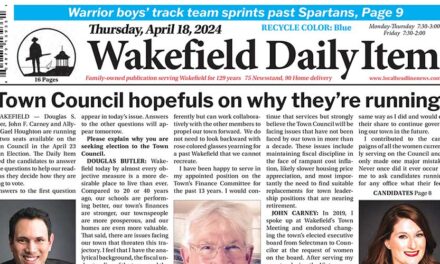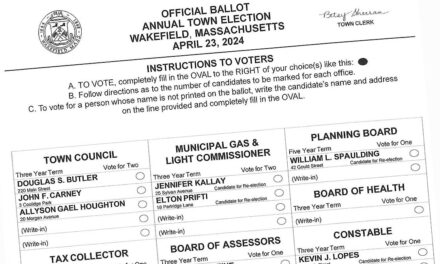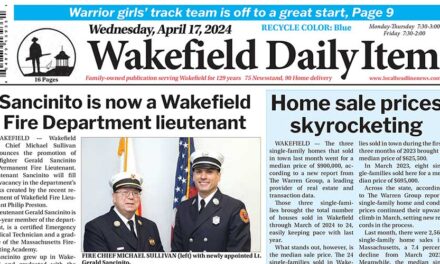BOSTON – A move is on to have the proposed 2024 Boston Olympics’ fate decided at the polls.
Yesterday, United Independent Party Chairman Evan Falchuk filed paperwork with the state Office of Campaign and Political Finance to create a ballot question group called the “People’s Vote Olympics Committee.”
In a press release, Olympics opponents say they were concerned in the aftermath of a Wednesday meeting where boosters of Boston’s Olympics bid presented their plans. “(M)any key questions either were never addressed, or were asked and evaded by organizers.”
The release continues, “Boston 2024 officials seemed to be glossing over the more difficult issues hosting the Olympics most definitely will entail,” said Falchuk, who ran for governor in November. “Raising critical questions about the billions the Games would cost, as well as security and traffic concerns, doesn’t make anyone a ‘naysayer.’ It makes us taxpaying, thinking adults who see the value of putting things like our seniors, veterans and kids in school above something like hosting the Olympics. Here are just 10 of the central questions that, bizarrely, were still left unanswered by Boston 2024 officials at the Jan. 21 meeting.”
1. Why didn’t we get the “full presentation,” as promised by officials? Organizers, including Boston 2024 President Dan O’Connell said, in the days before the event, we would see “exactly the presentation” they made to the U.S. Olympic Committee, including “the same cast of characters” who were in Redwood City, Calif., in December when the bid proposal for Boston was first presented behind the scenes. Oddly, missing from this Jan. 21 meeting were two of the key players at that secretive California meeting: Boston Mayor Marty Walsh and University of Massachusetts-Boston Chancellor Keith Motley. What else, exactly, was presented and promised on behalf of Massachusetts taxpayers behind those closed doors in California that Boston 2024 still chooses not to share with the public?
2. Why would Massachusetts residents voting on hosting the Olympics even be an issue? At the Jan. 21 meeting, Boston 2024 Chairman John Fish made much of the fact that Olympics in democratic countries are more successful. So, if democracy is good for business, why would Boston 2024 officials and our own lawmakers be against using it to decide if we want to get into this expensive business in the first place?
3. How much is this really going to cost Massachusetts taxpayers? At the Jan. 21 meeting, O’Connell said that the $4.7 billion he and his Boston 2024 colleagues thought it would cost to operate the Olympics was a “staggering” amount of money. He also said that there would be an additional $5 billion or so of transportation improvements paid for by Massachusetts taxpayers (which was not described as “staggering”) and some significant amount of money paid by U.S. taxpayers for security. Also, some amount of money might go to offset some costs incurred by cities and towns. This most central element was almost comically vague, considering multiple billions of dollars are at stake, and given the fact that Massachusetts already is running a very significant budget deficit while cities and towns across the Commonwealth face significant financial difficulties.
4. How does an unelected group get to set the agenda for our elected representatives and all Massachusetts voters? This is an important but overlooked dynamic. Chairman John Fish talked at length about the need to use the Olympics to “force” a conversation about “increasing the value of real estate outside Route 128 so that we can increase the value of real estate inside 128,” which according to him included building South Coast Rail, a high-speed rail connection to Springfield and increased rail service to Worcester. We just had an election that included these kinds of important issues and voters have a right to expect that their choices are respected from that process — not changed at the behest of this private group which repeatedly has refused to level with people outside its ranks.
5. Is it really still not clear that this is a statewide issue? Both Fish and O’Connell made it clear they thought the Olympics would affect the whole Commonwealth; to quote O’Connell, “It really has to be a Commonwealth Games.” They talked about possible venues in Springfield, Holyoke, Lowell and the South Coast. Assuming they believe that and given the whopping tax bill every Massachusetts taxpayer would very likely receive as a result, why should the Olympics be thought of solely as a Boston-centric issue?
6. How are people going to get around each day while all these venues are being built? The Boston 2024 team’s plans include some big construction projects in and near major traffic arteries that will take many years to complete. A concerned audience member at the Jan. 21 asked this completely legitimate question but the answer given focused on changing people’s commuting “behavior” during the 16 days of the Olympics, rather than in the years leading up to it. If anything, this important question was outright evaded at the Jan. 21 meeting.
7. Do the Olympics make money – and if so, for whom? Fish listed numerous cities where the Olympics were a “positive financial experience,” or “cash flow positive.” Does he mean that the entity that operated the Olympics made money or that taxpaying residents did? In this case, are they confident that Boston 2024 officials and their buddies would profit, or are they saying every taxpayer in Massachusetts helping to foot the bill would? To use their own numbers, if the cost of operating the Olympics in Boston is $4.7 billion and Boston 2024 earns $5 billion in revenue – but the taxpayers had to spend an additional $10 billion to make that happen – is that what Boston 2024 organizers would deem a “positive financial experience” for the people of Massachusetts?
8. What’s with all the continued secrecy and lack of community engagement? O’Connell apologized at the Jan. 21 meeting for the fact that there had been less outreach to the public than there should have been. Yet in addition to the many still-unanswered questions, not once did organizers address why Mayor Walsh signed an agreement requiring city employees to speak positively and actively promote the Olympics, the bid and the IOC. Why?
9. Do Boston 2024 believe what they’re saying in their own PR? Following the Jan. 21 meeting, The Boston Globe reported that Fish, who heads Suffolk Construction and chairs Boston 2024, told the crowd that “hosting the Olympics would lead to better transportation and housing for the entire state. ‘There’s no question: These games are a catalyst for economic growth, job creation and prosperity,’ he said.” This means one of two things: Either Fish and Boston 2024 have done a woefully terrible job with their due diligence of past Olympic experiences – which hardly bodes well for how he and his cohorts would actually run things – or they simply do not care if what they tell the public is true or not.
10. Where are our elected leaders? In the materials Boston 2024 released, they detailed numerous conversations with federal, state and local elected officials in Massachusetts about their bid during 2014. Pretty much all of our current lawmakers have either been silent about or enthusiastically supportive of the Olympics. Is there really no one willing to ask the tough, common-sense questions about hosting the Olympics and how it could easily impact families’ wallets in the years to come throughout Massachusetts? Why aren’t we hearing about or reading about elected officials saying their constituents should be able to vote on this issue?




